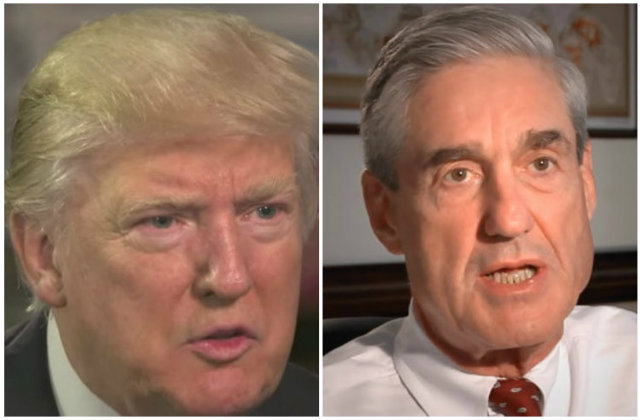
WASHINGTON (AP) — President Donald Trump‘s effort to keep Attorney General Jeff Sessions, a vocal and loyal supporter of his election bid, in charge of an investigation into his campaign offers special counsel Robert Mueller yet another avenue to explore as his prosecutors work to untangle potential evidence of obstruction.
The federal investigation into possible coordination between the Trump campaign and Russia already includes a close look at whether Trump’s actions as president constitute an effort to impede that same probe. Those include the firing of FBI Director James Comey, an allegation by Comey that Trump encouraged him to end an investigation into former national security adviser Michael Flynn and the president’s role in drafting an incomplete and potentially misleading statement about a 2016 meeting with Russians.
The latest revelation — that Trump directed his White House counsel, Don McGahn, to tell Sessions not to recuse himself from the Russia investigation — is known to Mueller’s investigators, who have interviewed many current and former executive branch officials. It adds to the portrait of a president left furious by an investigation that he has called a hoax and suggests that he worked through an intermediary to keep the inquiry under the watch of an attorney general he expected would be loyal.
Three people familiar with the matter confirmed to The Associated Press that McGahn spoke with Sessions just before he announced his recusal to urge him not to do so. One of the people said McGahn contacted Sessions at the president’s behest. All three spoke on condition of anonymity to avoid publicly discussing an ongoing investigation.
“What this adds that is new is that he took action to prevent, to attempt to prevent, Sessions from recusing himself,” said Notre Dame criminal law professor Jimmy Gurule, a former federal prosecutor. “So now we go simply beyond his state of mind, his personal beliefs, to taking concrete action to attempt to prevent Sessions from recusing himself.”
Though the episode makes clear Trump’s exasperation with the investigation, it remains unclear whether Mueller’s team has evidence to establish that the president’s collective actions were done with the corrupt intent needed to prove obstruction of justice.
Trump and his lawyers have repeatedly maintained that he did nothing improper and that, as president, he had unequivocal authority to fire Comey and to take other actions. They may also argue that the president was empowered to want the attorney general he appointed to oversee the Justice Department’s Russian meddling investigation or, as McGahn contended to Sessions, that there was no basis or reason at that time for the attorney general to recuse himself.
Jonathan Turley, a law professor at George Washington University who supports Sessions’ decision to recuse, said he sees Trump’s order to McGahn as another sign of the president’s novice — and norm-breaking — approach to governing, rather than evidence of any criminal wrongdoing.
“This may have been part of the learning curve,” Turley said. “It does not necessarily mean that he was covering up a crime.”
Turley said he believes McGahn made a mistake by agreeing to Trump’s demand that he lobby Sessions on his recusal, a move that would be “highly inappropriate” if the White House counsel went into the conversation knowing Sessions already had decided to step aside. To his credit, Turley said, McGahn appears to have backed off once he learned Sessions was following the advice of career ethics officials to recuse.
Asked about McGahn’s efforts to keep Sessions from recusing, one of Trump’s lawyers, John Dowd, told the AP, “I know nothing about that” and hung up. Jay Sekulow, another of the president’s personal lawyers, did not respond to phone messages Thursday or Friday seeking comment.
In stepping aside from the probe on March 2, Sessions said it was not appropriate for him to oversee any investigation into a campaign of which he was an active and vocal supporter, though the recusal also followed the revelation that he had had two previously undisclosed interactions during the 2016 campaign with the Russian ambassador to the United States. At his January confirmation hearing, he had said he had had no meetings with Russians
But soon before the announcement, with White House officials anticipating that Sessions might be poised to step aside, McGahn spoke to Sessions by phone. During the conversation, according to the people familiar with the matter, McGahn argued to Sessions there was no reason or basis at that time for him to recuse himself. One person said McGahn also told him that recusal would do nothing to resolve concerns over whether Sessions had given a misleading answer at his confirmation hearing.
McGahn ultimately accepted the conclusion of officials who believed that Sessions should recuse.
The episode underscores McGahn’s relevance to key moments of the Trump presidency that have come under Mueller’s scrutiny.
Besides contacting Sessions, he also was the White House official approached in January 2017 by Sally Yates, then the acting attorney general, over concerns that Flynn was vulnerable to blackmail because of conversations he’d had with the Russian ambassador. Mueller has expressed interest in knowing how that information was handled within the White House.
Sessions’ recusal left Deputy Attorney General Rod Rosenstein in charge of the Russia investigation. But once Trump fired Comey two months later, Rosenstein appointed Mueller, the former FBI director, to run the investigation and to report to him.
Four people, including Flynn and Trump’s former campaign chairman, have been charged so far in the investigation.
The Sessions recusal has been a sore spot for Trump for months, with the president publicly deriding the decision and lamenting his selection of the former Alabama senator as his attorney general.
In a July interview with The New York Times, Trump said, “Well, Sessions should have never recused himself, and if he was going to recuse himself, he should have told me before he took the job, and I would have picked somebody else.”
[image via screengrab/ABC/FBI]